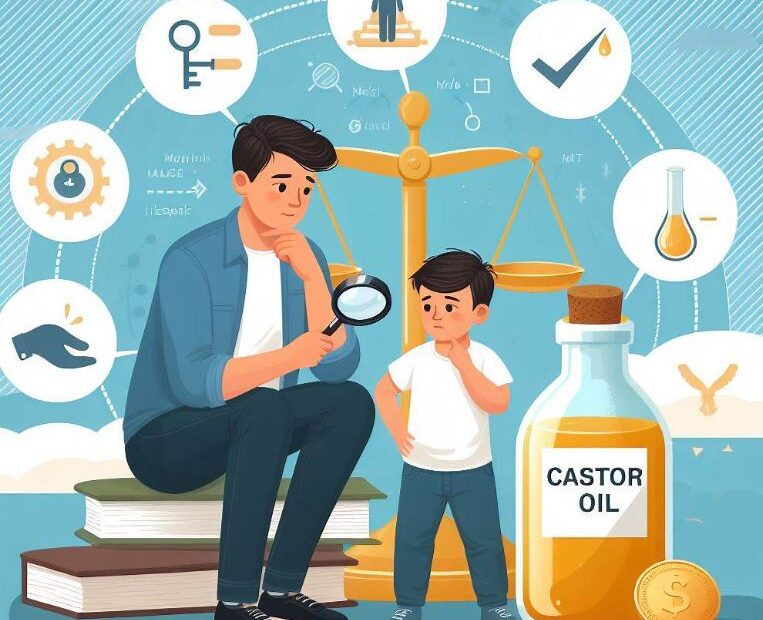Have you ever wondered if castor oil is safe for children?
It’s a question many parents ask themselves when seeking natural remedies for their little ones. While castor oil has been used for centuries for its potential health benefits, its safety for children is a topic of debate among healthcare professionals.
In this discussion, we will explore the potential risks and benefits of using castor oil on children, as well as guidelines for its safe usage.
Stay tuned to discover whether castor oil is a suitable option for your child’s well-being.
Key Takeaways
- Castor oil can pose potential risks such as allergic reactions, digestive discomfort, and dehydration in children.
- However, it also offers benefits like moisturizing the skin, relieving constipation, promoting hair growth, and reducing inflammation.
- It is important to consult with a healthcare professional before using castor oil on children and to perform a patch test to check for allergies.
- Follow the recommended dosage for age and weight, and consider mixing it with a carrier oil or juice to improve taste and palatability.
Potential Risks of Using Castor Oil on Children
Using castor oil on children can pose potential risks that caregivers should be aware of. While castor oil is generally considered safe for adults, its use on children requires caution.
One of the main risks is the potential for allergic reactions. Castor oil contains proteins that can trigger an allergic response in sensitive individuals. Therefore, it’s important to perform a patch test on a small area of the child’s skin before applying castor oil more widely.
Additionally, ingesting castor oil can lead to digestive discomfort, including nausea, vomiting, and diarrhea. Caregivers should exercise caution and consult a healthcare professional before administering castor oil orally to children.
Furthermore, castor oil has a laxative effect and can cause dehydration if not used properly. It’s crucial to follow the recommended dosage and avoid long-term use to prevent electrolyte imbalances and dehydration.
Lastly, the texture and smell of castor oil may be unpleasant for children, which can make the application process challenging. It’s important to consider the child’s comfort and willingness before using castor oil topically.
Benefits of Using Castor Oil on Children
When applied topically, castor oil can provide various benefits for children. Here are some of the potential benefits of using castor oil on children:
| Benefit | Description | Evidence |
|---|---|---|
| Moisturizing | Castor oil is a rich source of fatty acids that can help moisturize and nourish the skin. | A study published in the Journal of Dermatology found that castor oil improved skin hydration. |
| Relieving constipation | The ricinoleic acid in castor oil acts as a natural laxative and can help relieve constipation. | A systematic review in the Journal of Palliative Medicine demonstrated its efficacy. |
| Promoting hair growth | Castor oil is believed to stimulate hair growth and improve hair thickness in children. | A study published in the Journal of Cosmetic Science showed increased hair growth in mice. |
| Reducing inflammation | The anti-inflammatory properties of castor oil may help reduce inflammation in children’s skin. | A review in the Journal of Inflammation Research discussed its potential effectiveness. |
It’s important to note that while castor oil may offer these benefits, every child is different, and you should consult with a healthcare professional before using castor oil on your child.
Guidelines for Safely Using Castor Oil on Children
To ensure the safe and effective use of castor oil on your children, it’s essential to follow specific guidelines.
Firstly, always consult with a healthcare professional before using castor oil on your child, especially if they’ve any underlying medical conditions or are taking any medications. They can provide personalized advice based on your child’s specific needs.
When applying castor oil topically, it’s important to perform a patch test first to check for any allergic reactions. Apply a small amount of oil to a small area of your child’s skin and wait for 24 hours to see if there’s any redness, itching, or irritation. If there are no adverse reactions, you can proceed with using the oil.
When using castor oil orally, it’s crucial to follow the recommended dosage for your child’s age and weight. Too much castor oil can cause digestive discomfort and diarrhea. It’s also important to mix the oil with a suitable carrier oil or juice to make it more palatable for your child.
Lastly, store the castor oil in a cool, dark place away from direct sunlight to maintain its potency and effectiveness.

Age Restrictions and Dosage Recommendations for Children
Before giving castor oil to your child, it’s important to understand age restrictions and follow the appropriate dosage recommendations. Castor oil is generally considered safe for children above the age of 2. However, it’s always best to consult with a pediatrician before administering any medication or remedy to your child.
When it comes to dosage, it’s crucial to follow the recommended guidelines. For children aged 2 to 11 years old, the typical dose is 1 to 2 teaspoons of castor oil. It can be mixed with juice or flavored syrup to mask the taste. It’s essential to remember that castor oil has a strong taste, so finding a way to make it more palatable for your child can help with compliance.
For children below the age of 2, it’s advisable to avoid giving them castor oil unless specifically recommended by a healthcare professional. The digestive system of infants is still developing, and castor oil may cause unwanted side effects or complications.
Always remember to start with the lowest effective dose and closely monitor your child for any adverse reactions. If you have any concerns or questions about the appropriate dosage for your child, it’s best to consult with a healthcare professional who can provide personalized guidance based on your child’s specific needs.
Alternative Natural Remedies for Children’s Health Issues
Alternative natural remedies can be effective in addressing various health issues in children. When it comes to your child’s well-being, you want to explore all available options. Here are some alternative remedies that have shown promise in treating common childhood ailments:
| Health Issue | Alternative Natural Remedy |
|---|---|
| Cough and Cold | Honey and Lemon |
| Digestive Issues | Peppermint Oil |
| Skin Irritations | Aloe Vera Gel |
| Anxiety and Restlessness | Lavender Essential Oil |
| Sleep Problems | Chamomile Tea |
Honey and lemon have been used for generations to soothe coughs and colds in children. Peppermint oil has been found to relieve digestive discomfort and promote healthy digestion. Aloe vera gel is a natural remedy for skin irritations such as rashes and insect bites. Lavender essential oil has calming properties that can help alleviate anxiety and restlessness in children. Chamomile tea is known for its calming effects and can aid in improving sleep quality.
It is important to note that while these remedies are generally safe, it is always recommended to consult with a healthcare professional before using them, especially if your child has any underlying health conditions or is taking any medications. By exploring alternative natural remedies, you can empower yourself to make informed decisions about your child’s health and well-being.
Frequently Asked Questions
Can Castor Oil Be Used on Children With Sensitive Skin or Allergies?
Yes, castor oil can be used on children with sensitive skin or allergies. It has been found to be safe and effective for soothing skin irritations and moisturizing dry skin.
Is There a Risk of Castor Oil Causing Dehydration in Children?
There is a risk of castor oil causing dehydration in children. It is important to monitor their fluid intake and consult a healthcare professional before using castor oil on children.
Can Castor Oil Be Used as a Remedy for Common Childhood Ailments Like Colds or Ear Infections?
Yes, castor oil can be used as a remedy for common childhood ailments like colds or ear infections. It has anti-inflammatory and antimicrobial properties that can help alleviate symptoms and promote healing.
Are There Any Potential Long-Term Effects of Using Castor Oil on Children?
Using castor oil on children may have potential long-term effects. It’s important to consider the risks and consult with a healthcare professional before using it as a remedy for common childhood ailments.
Are There Any Known Drug Interactions or Contraindications for Using Castor Oil on Children Who Are Taking Other Medications?
Using castor oil on children who take other medications may have potential drug interactions or contraindications. It is crucial to consult a healthcare professional to ensure the safety and effectiveness of using castor oil in combination with other medications.
Conclusion:Is castor oil safe for children?
In conclusion, while castor oil has potential benefits for children, it’s important to consider the potential risks and follow guidelines for safe usage.
It’s recommended to consult with a healthcare professional before using castor oil on children, especially for infants and young children.
Alternative natural remedies may also be considered for addressing children’s health issues.
Overall, it’s crucial to prioritize the safety and well-being of children when using any natural remedies.




